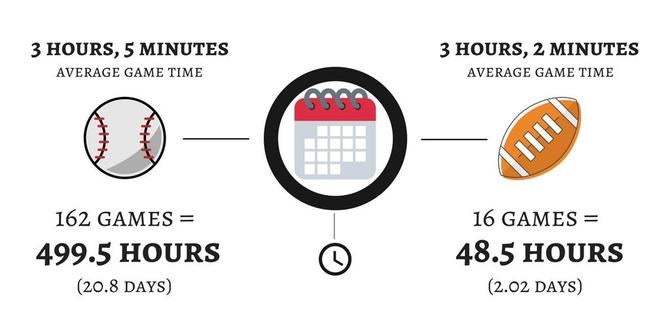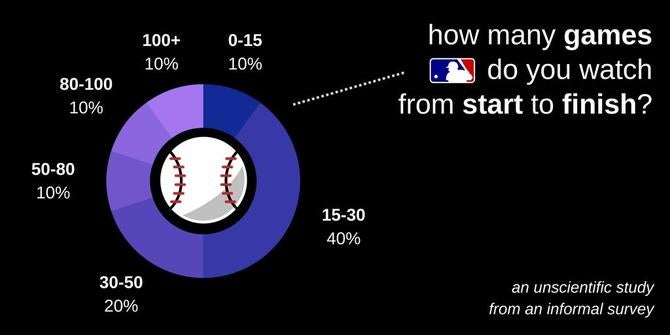It was a Friday afternoon, and the Philadelphia Phillies were a still a day away from hosting their own weekend fish fry and dropping 20 on the Miami Marlins.
Freshly removed from watching the Phils' first series against the New York Mets, I spent a few minutes talking baseball with a good friend from New Jersey, the resident Mets fan among my long-distance college buddies. (He also roots for the Steelers and the 76ers, so it's a wonder we still converse at all.)
But in between the usual chitchat about Gabe Kapler's #analytics, Matt Harvey's health and the 2018 outlook on two NL East foes, there arose some deeper curiosities. There, in a conversation fueled by the excitement of the start of a new season, came questions about how long said excitement would last.
Because, unlike, say, in the fall, when your favorite football team is only around for 20 meaningful games at the most, baseball season arrives like the refreshing blossoms of spring but can fizzle out of interest -- or at least struggle to maintain yours -- over the long haul of 162 outings.

Even if, somehow, every MLB game was only two and a half hours and every NFL game was three hours, we're looking at a 357-hour difference in regular-season commitment. That means you'd need to watch football 24/7, with no breaks, for almost 15 days straight to even match the time it takes to watch one team's MLB season..
Our questions about the excitement of the season weren't so much centered on a disinterest in the game or particular teams as they were an interest in knowing how often -- and how much -- we each planned to dedicate to certain teams in 2018. They were genuine inquiries about what it means to be an MLB fan.
Now, in a world where sports are increasingly consumed in on-demand fashion and attention spans are ever so fleeting, I pose those questions to you -- not with any serious intention of finding the "right" answers but rather of carrying on the conversation:
How many of an MLB team's 162 games, if any, do you think you need to watch to be considered a "true" fan?
Debating who is and isn't a "true" fan is even sillier than being a fan and debating games that are played by people other than ourselves.
As CBS Sports' own Matt Snyder said, "I would never put a number on this."
And yet, when you're dealing with such a long season where games occur on an almost-daily basis, this is also intriguing. Perhaps more than anything, it raises a better, overarching question ...
How would you define "watching" a game? Seeing every inning? Keeping the game on in the background of other activities? And for good measure, what about listening to parts of the game on the radio? Or following updates on CBSSports.com's GameTrackers?
This is where the truth comes out. Or does it? It's far easier to say you've watched 130 of your favorite team's 162 games when "watching" constitutes eight to 10 glances at the TV in between video games on another screen, or when "watching" means catching an inning over your lunch break. Let's be real: Most MLB fans probably watch less baseball than they're willing to admit -- unless, of course, they are either 1.) retired, 2.) not working a full-time job or 3.) not doing their full-time job.
At least anonymously, the consensus on what it means to "watch," via opinions I gathered from about a dozen colleagues, friends and fans, is rather lenient in that most seem OK with defining "watching" as "loosely following."
"I think watching a game can be any of those things," one person said, adding that Twitter is another source of coverage. "As long as the game is on and you're checking on it."
Snyder, meanwhile, said "watching," to him, comes down to seeing a game on TV or in person.
Personally, I'd divvy up "watching" into two categories: 1.) Intently watching at least a majority of the game, and 2.) Following in the background. Seeing or listening to every inning would obviously fall into the first, whereas just about anything secondary -- occasionally checking the game or using an online tracker -- would fall into the second.
The beauty of baseball's long season, though, is that even second-category "watching" shouldn't really be held against you. This is never more apparent than when attending a MLB game in person. Whereas a trip to an NFL game is or should be mostly about the game, a trip to a MLB game can be an event -- a gigantic picnic, of sorts. That's not to say every pitch isn't important, but the pressure isn't as magnificent knowing there are 161 other games to be played and oh, hey, let's get some peanuts and ice cream!
On average, how many of your favorite MLB team's 162 games do you watch each season?
This comes back to how you define "watching." But it can also depend on your favorite team's competence.
CBS Sports' Kevin Skiver, for example, said he isn't ashamed to admit that his game intake depends on the year.
"The Tigers are and will be trash this year, so you'll see me watching less," he said. "I don't need to see Miguel Cabrera and the Rebuild Crew tear it all down and start from the ground up. If you want me to average it out? I'll watch 50-60 games, and that's in a good year. In years like this? Will probably be between 10-20. But I'll have most of them on as background noise without actively watching."
Another person who identified as both a Chicago Cubs and Tampa Bay Rays fan said "it can depend on how their respective seasons are going and how the schedule lines up," but that they follow probably 150-160 games per season.
Here, again, is where baseball's long season benefits the fan -- or where baseball fans could be defined differently. Going back to the Tigers example, if, say, Kevin were also a Lions fan and the Lions were awful, there might be added pressure to watch them regardless of their woes because the Lions only play 16 times a year, whereas an awful Tigers team would take its 162 games and say, "If I go, we all go."
On average, how many of those games do you watch in their entirety?
"Entirety" has to mean most pitches and definitely every inning. And it's this question that drew the most disparity in opinions I received.

Our good old Mets fan, the one who initiated this discussion, said he shoots to watch half of New York's games in full, meaning an 81-81 split between intently watching and watching secondarily. If the Tigers were good, Kevin said he'd aim to watch 20-30 games in their entirety. Others fell closer to that range, admitting they'd have time for something like 15-30 games in full. One person, albeit a college student with presumably more spare time, said they estimate seeing as many as 100 games from start to finish.
Snyder has them all beat, admitting that he watches "as close to every inning as is humanly possible" and that, "when the dust settles," he has about 157 games in the bag. That, however, is at least in part because, well, it's his job.


















